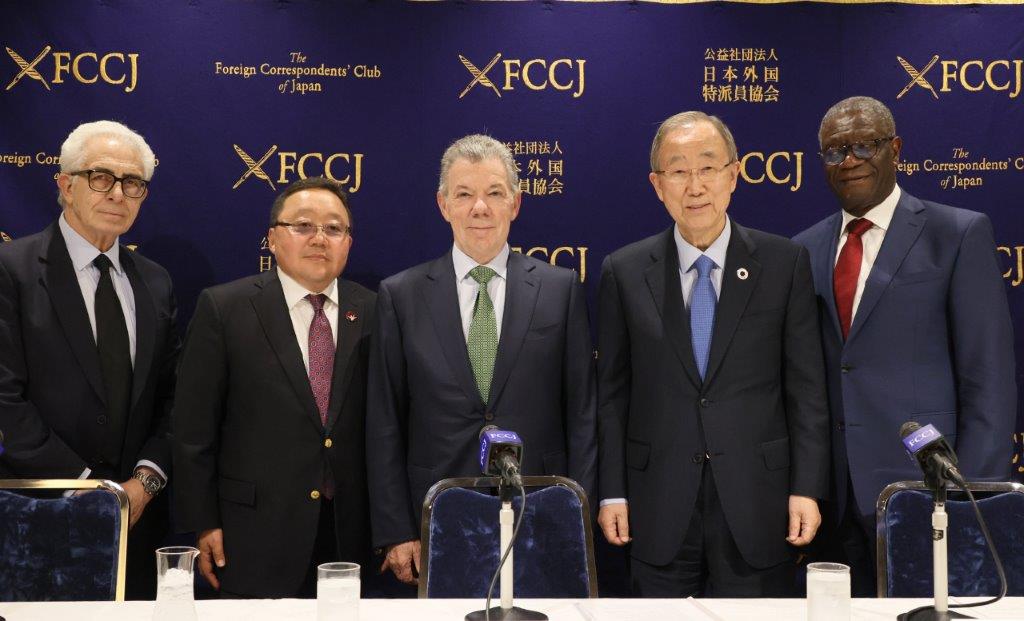Issue:
June 2025
Members of The Elders issue nuclear warning during FCCJ appearance

The Foreign Correspondents’ Club of Japan hosted one of its most distinguished panels ever when a former UN Secretary-General, three former heads of state, and two Nobel Laureates spoke here in May.
The men are members of The Elders, an independent organization founded in July 2007 by Nelson Mandela, Jimmy Carter, and former U.N. Secretary-General Kofi Annan, that promotes peace and nuclear disarmament, human rights, and environmental sustainability.
The panelists - Juan Manuel Santos, chair of The Elders and former president of Colombia, introduced former UN Secretary General Ban Ki-moon, Elbegdorj Tsakhia, former president and prime minister of Mongolia, Ernesto Zedillo, former president of Mexico, and Dr. Denis Mukwege, a Nobel Peace Prize Laureate - had all just visited Hiroshima to mark the upcoming 80th anniversary of the atomic bombing on 6 August 1945 and, six days later, the end of World War II.
During their visit to Japan the dignitaries met hibakusha – survivors of the atomic bombings – in Hiroshima, as well as Prime Minister Shigeru Ishiba and Diet members in Tokyo.
Having awarded last year’s Nobel Peace Prize to the hibakusha group Nihon Hidankyo, the Norwegian Nobel Committee plans to hold a nuclear disarmament event in Japan in July.
“We came to Japan… to pay our respects to the victims of the A-bombs,” said Nobel Peace Laureate Santos, “to call on world leaders and the world in general to initiate some kind of dialogue to control the increased risk of nuclear war”.
He added: “We told the prime minister that Japan at this moment can exercise special leadership.”
Former Mexican president Zedillo was even more direct on Japan’s decision not to join the Nuclear Non-Proliferation Treaty (NPT), which bans the possession and use of nuclear weapons and has been ratified by 73 countries and regions.
“We expect Japan to be more engaged in the movement towards the abolition of nuclear weapons,” he said.
Japan has called for greater dialog to advance nuclear disarmament, which has stalled since 2022. But it faced criticism after failing to attend as an observer a convention of NPT signatories in March. The U.N. will meet next year to review the NPT treaty, which went into effect in 1970.
Former U.N. Secretary-General Ban was not optimistic about the current security climate. “I am deeply concerned at this time that big powers now are talking about the use of nuclear weapons,” he said. “(Russian President) Putin was slightly suggesting… he may use nuclear weapons. India and Pakistan - who knows what will happen?”
Zedillo said concerns about the U.S.’s commitment to defend its allies, including Japan and South Korea, had prompted concerns that those nations could develop their own nuclear deterrents. “Given the attitude and behavior of the U.S. government recently, that (joint) security is being questioned,” he said. “Nuclear weapons will not give security to the world. The only thing that will give security will be … abolition and safeguards.”
Noting that the symbolic “Doomsday Clock” had moved closer to nuclear midnight than at any time in its 77 years, Santos blamed the dearth of global leadership. “We need leadership that looks beyond the next election and takes action, even if unpopular,” he said.
Dan Sloan is president of the FCCJ. He joined the club in 1994 and previously served as president in 2004 and 2005-06. He reported for Knight-Ridder and Reuters for nearly two decades.

